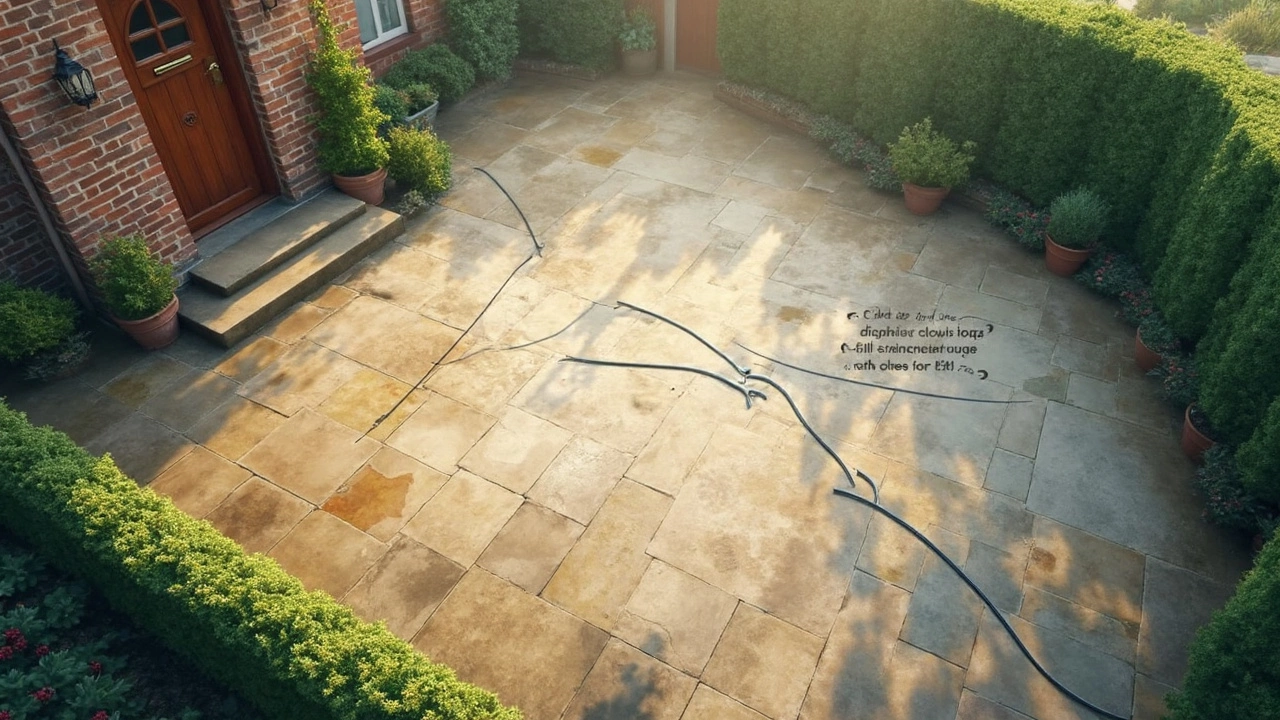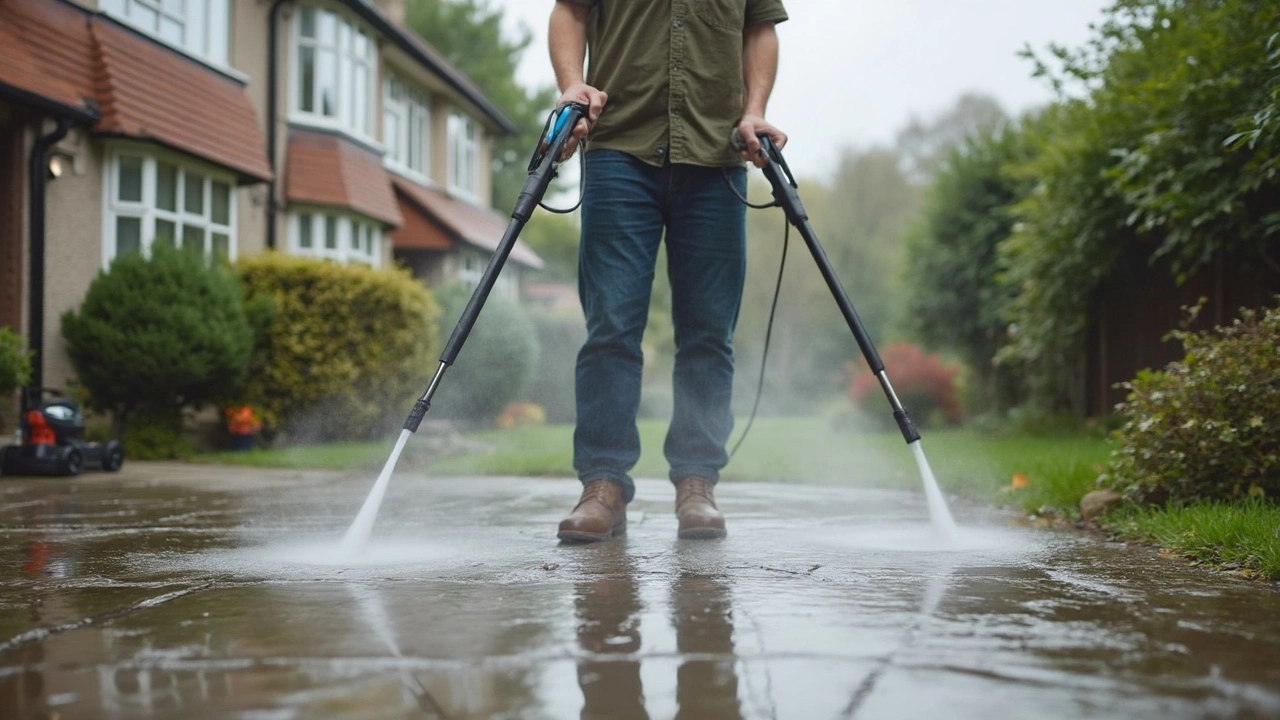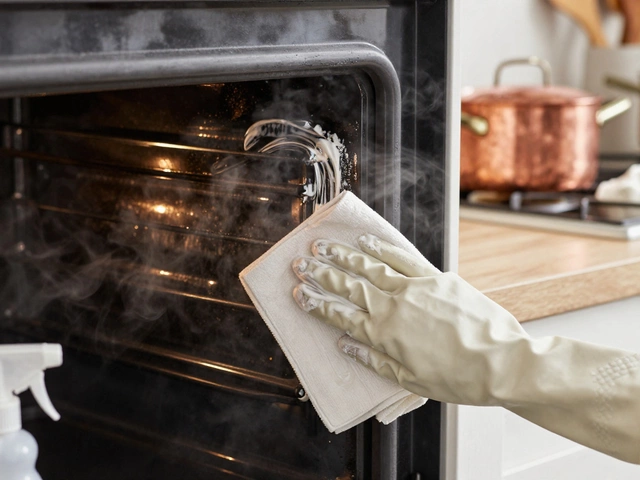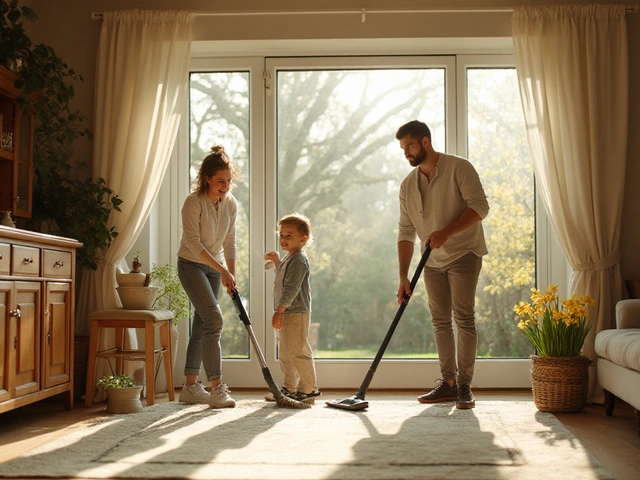If you set your pressure washer too low, stubborn stains stick around. Blast it too high, and you risk gouging the concrete or stripping away the finish. The right PSI (pounds per square inch) makes the difference between a spotless driveway and a DIY mess you’ll regret.
For most concrete driveways, you need somewhere between 2,500 and 3,000 PSI to break up grime, algae, and oil spots. That’s more than a basic electric washer offers. Gas-powered models typically hit the sweet spot, letting you clean faster and deeper with less effort. A lot of folks are surprised—regular garden hoses barely reach 50 PSI, so even a middling pressure washer feels like a power tool in your hands.
Before you get started, check the age and condition of your driveway. Older concrete or brick can be more brittle and may not love high-pressure blasts. On the flip side, newer, sealed driveways can usually handle it. Always test a small area first. It’s a lot easier to be cautious than to repair chips and craters later.
- Why PSI Matters for Your Driveway
- Finding the Sweet Spot: Recommended PSI Range
- Gas vs Electric Pressure Washers: What Works Best
- Choosing the Right Nozzle for Driveway Cleaning
- Common Mistakes and How to Avoid Them
- When to Call in a Pro (and Save Your Concrete)
Why PSI Matters for Your Driveway
Not all driveways are built the same, and neither are pressure washers. PSI directly affects how well you clean concrete and whether you accidentally blast away more than dirt. Too little, and stubborn stains won’t budge. Too much, and you could carve lines, loosen aggregates, or mess up expansion joints. That’s not just ugly—it can turn basic maintenance into expensive repairs.
The main goal is to use enough power to lift off mold, oil, mud, and tire marks without ruining the surface. Most driveway experts agree that concrete handles 2,500 to 3,000 PSI just fine. Anything lower might leave behind grime, and higher settings can dig into the surface, especially if your nozzle stays in one spot for even a few seconds.
| Application | Recommended PSI |
|---|---|
| Basic Dirt/Algae | 1,500–2,000 |
| Oil Stains | 2,500–3,000 |
| Heavy Stains/Tire Marks | 2,700–3,000 |
| Delicate Brick/Stone | 1,000–1,500 |
Think of it like using the right tool for the job. A PSI for driveway cleaning that’s matched to your surface gets the best results. Using the wrong setting is why you see driveways that look patchy or flaky years later.
If you’re using a pressure washer at home, test your settings on a corner or edge first. Hold the wand about a foot from the surface and move in smooth passes—never let it linger. By knowing the right PSI, you actually give your driveway a fresh, clean look without stressing about long-term damage.
Finding the Sweet Spot: Recommended PSI Range
Let’s get real about the numbers. When you’re washing a concrete driveway, the PSI for driveway cleaning isn’t guesswork. Experts and pros tend to settle between 2,500 and 3,000 PSI as the ideal range. You go far below this, and you’ll be scrubbing stains for hours. Push much above 3,000, and you risk stirring up trouble with the surface—especially if the concrete is older or cracked.
If you have a brick or paver driveway, dial things back. Bricks get chipped at higher pressures, so stick around 1,500 to 2,000 PSI. Painted or sealed concrete also likes gentler pressure to avoid stripping the topcoat.
| Driveway Type | Recommended PSI |
|---|---|
| Standard Concrete | 2,500–3,000 |
| Brick or Pavers | 1,500–2,000 |
| Painted/Sealed Concrete | 1,200–1,800 |
Still not sure if you’re picking the right number? Here’s a quick checklist:
- Check your washer’s specs. Most gas pressure washers can get you into the 2,700–3,200 PSI range, but double check the label.
- Test a small, hidden spot on your driveway first. Watch how the water hits the surface. If you see concrete chips flying, lower the pressure.
- If you’ve got serious oil stains, don’t just crank up the PSI. Use a concrete cleaner and let it soak first. Pressure alone can’t erase old oil without some help.
Bottom line, stick with the range that matches your surface. A little caution means your driveway comes out clean without accidental damage.
Gas vs Electric Pressure Washers: What Works Best
If you’re anxious about cleaning a driveway, the type of pressure washer really matters. Here’s the deal: most electric models max out at around 2,000 PSI, while a standard gas-powered pressure washer easily cranks out 2,800 or even 3,000 PSI. That bump in power is the difference between just rinsing off dust and blasting away years of grime.
Electric pressure washers are usually quieter, lighter, and easier to store. They’re not a bad pick for patios, outdoor furniture, or rinsing the car. But for a tough concrete job — especially if you’ve got oil stains or moss — you’ll usually need the muscle of a gas washer. Most pros stick to gas for driveways because of the time saved and deeper cleaning.
There’s another thing: gas washers also move more water per minute (GPM), so you get both stronger spray and faster rinsing. That’s a double win when you’re up against a big driveway. As Mark Spurgeon, a senior project manager at Pressure Washers Direct, puts it:
"Gas pressure washers aren't just stronger — they move way more water, which means less time spent re-washing spots and a cleaner surface overall."
If you do go with an electric model, know its limits. It’ll handle light dirt just fine, but you might spend extra time on stubborn stains, and they can struggle with bigger driveways. For most homeowners, renting or buying a gas-powered model just for the big jobs is well worth the money.
Bottom line? If you want that deep clean and efficiency for your driveway, PSI for driveway cleaning really favors gas-powered washers. Save the electric ones for lighter chores and smaller spaces.

Choosing the Right Nozzle for Driveway Cleaning
The nozzle you pick matters just as much as the PSI when it comes to knocking out dirt and oil. Every pressure washer comes with a set of color-coded nozzles, and each one shoots water at a specific angle. Too narrow, and you can scar the concrete. Too wide, and you’ll be scrubbing forever without results.
Here’s what those nozzle colors mean:
- Red (0°): Shoots a laser-thin jet. Never use this one on your driveway—it’ll carve lines right into the surface.
- Yellow (15°): Packs lots of punch, good for stripping paint or blasting off thick grime–but go slow and stay alert so you don’t damage the concrete.
- Green (25°): This is the go-to choice for most pressure washing driveways. It’s strong enough for deep cleaning but wide enough to avoid gouges. If you’re not sure, start with green.
- White (40°): Covers more surface and is gentle. Good for rinsing away soap or dirt, but sometimes lacks the muscle for tough stains.
- Black (65°): Used mostly for soaping up surfaces, not for rinsing or scrubbing.
Here’s a tip—work in sections, and keep the nozzle at least a foot above the surface until you see how the concrete reacts. Move the wand slowly and evenly, overlapping passes to avoid stripes. You’ll use less water, and you won’t end up with a patchy driveway.
If your washer has a turbo or rotary nozzle, you can use it for those stubborn oil spots or heavy moss, but watch out: these spin fast and hit hard. Always wear safety glasses, because debris can really fly with these attachments.
Common Mistakes and How to Avoid Them
It’s shockingly easy to mess up pressure washing if you rush in. Ruined concrete, streaks, and wasted time—they usually come from avoidable slip-ups. Here’s what people get wrong most when chasing the perfect clean driveway, plus how you can skip all the hassle.
- Wrong PSI choice: Going too high turns a pressure washer into a concrete-eating beast, especially if you hang around one spot. Using too little? You only water the dirt. Stick in that 2,500–3,000 PSI range for regular concrete. If your surface is older or already cracked, go for the lower end and test first.
- Nozzle mistakes: Using a 0-degree nozzle is almost never worth it for driveways. It cuts deep channels. Stick to 25-degree (green tip) or 15-degree (yellow tip). They’re tough on grime but kind to concrete.
- Distance problems: Getting your nozzle too close can dig holes or lift the concrete’s top layer. Most folks should keep a 12-inch gap between the washer tip and the driveway. Move slowly and don’t linger on one spot.
- Skipping the sweep: Blasting loose dirt gets in the way. Sweep off leaves, rocks, or chunks before turning the washer on—you’ll avoid splattering and clogging your tip.
- No pre-treating: Oil stains and old gum don’t always budge with water alone. Use a concrete-safe cleaner first. Let it soak for 10–15 minutes before washing.
Ever wonder what happens when you ignore these basics? Check out the difference in driveway results based on typical mistakes:
| Mistake | Result | Fix |
|---|---|---|
| PSI over 3,500 | Pits, lines, surface damage | Dial back to 2,500–3,000 PSI, test first |
| Using 0° nozzle | Etched grooves in surface | Switch to 15° or 25° nozzle |
| Skipped cleaning prep | Mud splatter, uneven wash | Sweep and pre-treat stains |
| Nozzle too close | Chipped concrete, rough surface | Keep 12-inch distance |
Getting your PSI for driveway right, picking the gentle nozzle, and adding those quick prep steps make a world of difference. Take an extra 10 minutes, and you avoid hours of regrets—plus some awkward calls to your local concrete repair guy.
When to Call in a Pro (and Save Your Concrete)
Sometimes it pays to hand off the job—even if you’ve got the right gear. Pressure washing contractors do more than just blast away dirt. They spot cracks early, mix specialized cleaning solutions, and know what pressure settings different surfaces can handle. If your driveway is pitted, stained with oil, or has thick moss growing in the joints, a pro’s touch can save you hassle and money.
One stat says pros remove up to 90% more embedded grime than the average DIY job. They’re loaded with commercial washers that pump out 4,000 PSI or higher—effortlessly tackling stuff a rental won’t scratch. Plus, pros use pretreatments for oil stains, saving you from buying trial-size bottles that may not work.
Bigger jobs, like driveways with heavy tire marks, years of leaf stains, or surfaces near delicate landscaping, are also good reasons to call someone in. If you see flaking, crumbling, or exposed rebar, don’t even try to wash it yourself. Professional cleaners know how to work around aging concrete without causing more damage.
Here are some clear signs you should consider hiring an expert:
- You see large oil or rust stains that don’t budge with regular cleaning.
- The surface is cracked or crumbling, and you’re worried about causing more damage.
- There’s mold or heavy algae growth—especially if it keeps coming back.
- Your driveway is extra-long or sloped, making it risky to handle alone.
- You just don’t have the time or you’ve tried and failed before.
Here’s a quick look at the numbers comparing DIY and pro pressure washing for a typical two-car driveway:
| Factor | DIY | Professional |
|---|---|---|
| Cost | $50–$120 (rental & supplies) | $150–$300 |
| PSI Used | 2,000–3,000 | 3,500–4,000+ |
| Time to Clean | 2–4 hours | 1–2 hours |
| Stain Removal | Moderate | Deep/Complete |
| Risk to Concrete | Higher (inexperienced use) | Low (experienced) |
Paying a little more up front saves you from DIY disasters, busted concrete, and recurring stains. If you want your PSI for driveway to do its job right the first time, sometimes letting a pro handle it is the smartest move.





